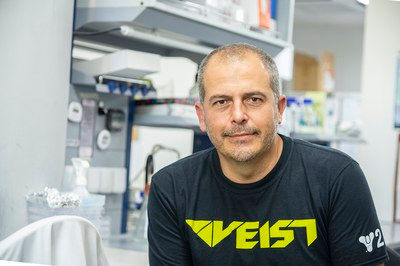Meet Dr. Diego Medina
- Yash Gandhi Foundation
- Jul 28, 2024
- 2 min read

Meet Dr. Diego Medina, co-recipient of this year's $90,000 research grant from the Yash Gandhi Foundation! We are honored to fund ML2TREAT: Application of fluorescence-based high-throughput screening approaches to identify small compounds to treat Mucolipidosis type II (ML II) for the next 18 months. This project is being undertaken by Drs. Diego Medina and Thomas Braulke. 🔬🧪🧫💜
Diego Medina was born in Seville, Spain. He graduated in Biological Sciences at the University of Seville (Spain) and then completed a Master in Neurophysiology at the International University of Andalucía (Spain). He then moved to Madrid to pursue his PhD in Biochemistry and Molecular Biology at the Instituto de Investigaciones Biomedicas/CSIC, which was supported by a National Fellowship. During this period, he also received training at the NIH in the US and the Stazione Zoologica in Naples, Italy.
After completing his PhD, Medina won consecutive EMBO and Marie Curie postdoctoral fellowships to work as a postdoctoral student at the EMBL in Monterotondo, Rome (Italy), where he focused on neuroscience using mouse genetics. Following his postdoctoral studies, he joined Eli Lilly & Co. as a Researcher in the Lead Optimization Biology Department in Alcobendas-Madrid, Spain and Indianapolis, US. There, he gained valuable experience in drug discovery and high content imaging screening approaches.
In 2007, Medina returned to basic research in the laboratory of Andrea Ballabio at TIGEM (Naples, Italy), where he worked on elucidating the biological mechanisms underlying lysosomal storage disorders (LSDs). Since 2011, he has held positions as Associate Investigator, founder, and Head of the High Content Screening Facility at TIGEM. In 2019, he became an Associate Professor of Applied Biology at the "Federico II" University in Naples.
Medina's current research interests center on discovering new 'druggable' targets and developing pharmacological strategies to treat rare genetic diseases. His laboratory employs high-content imaging and repurposing approaches. Recently, Medina's team identified two FDA-approved compounds, tamoxifen, and fluoxetine, that ameliorate CLN3 and CLN7 Batten diseases and mucopolysaccharidosis type IIIA, respectively. He has also obtained Orphan Drug Designation from the EMA for tamoxifen to treat Batten disease and was awarded funding to develop phase I-II clinical trials with fluoxetine.

Comments